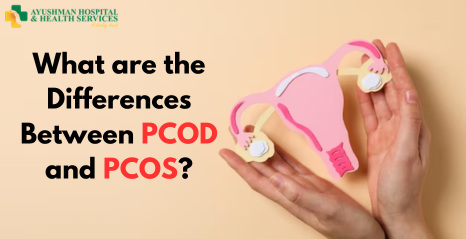You’ve probably heard of PCOD and PCOS and might use the terms interchangeably, but it’s important to recognize that they’re not the same and should be handled differently. PCOS (polycystic ovary syndrome) and PCOD (polycystic ovary disease) are two hormonal disorders that affect many women globally. Although their names sound similar, It is important to understand the differences between PCOD and PCOS for accurate diagnosis, proper treatment, and effective management. This article will explore the features, symptoms, and consequences of both conditions.
What is PCOD: Polycystic Ovary Disease?
PCOD, or polycystic ovary disease, is a hormonal disorder where multiple small cysts form on the ovaries. It’s also known as polycystic ovary syndrome (PCOS). PCOD is mainly used to talk about how the ovaries look, while PCOS refers to a broader clinical syndrome that includes various symptoms and hormonal imbalances.
Common symptoms of PCOD include irregular menstrual cycles, ovarian cysts, and hormonal imbalances causing excess production of androgen (male hormone). This hormonal imbalance may lead to issues like acne, excessive hair growth (hirsutism), and weight gain. Women with PCOD might also face fertility challenges due to irregular or absent ovulation.
What is PCOS: Polycystic Ovary Syndrome?
PCOS is a more comprehensive term that covers not just the structural aspects (multiple cysts) seen in PCOD but also the associated symptoms and metabolic issues. To diagnose PCOS, a woman needs to experience at least two out of the following three criteria:
- Irregular or absent menstrual cycles: Women with PCOS often have infrequent periods or long gaps between cycles.
- Hyperandrogenism: This involves excess production of androgens, leading to symptoms like hirsutism, acne, and male-pattern hair loss.
- Polycystic ovaries: Ultrasound imaging may show multiple small cysts on the ovaries, contributing to the PCOS diagnosis.
Additionally, PCOS is linked to metabolic problems like insulin resistance, making it challenging to regulate blood sugar levels and increasing the risk of developing type 2 diabetes. Women with PCOS may also have higher levels of cholesterol and triglycerides, raising their risk of cardiovascular disease.
Differences Between PCOD and PCOS
The main difference between PCOD and PCOS lies in their focus. PCOD looks at the structural aspect of having multiple cysts on the ovaries, while PCOS is considered a broader clinical syndrome with hormonal imbalances, menstrual irregularities, and metabolic disturbances.
Here’s a simplified table outlining the differences between PCOD and PCOS:
| Aspect | PCOD | PCOS |
| Definition and Diagnosis | Several tiny cysts are present on the ovaries, accompanied by irregular menstrual cycles. | Broader syndrome with hormonal imbalances, irregular periods, and cysts |
| Hormonal Imbalances | Diagnosed based on cysts and irregular periods | Involves additional hormonal imbalances, such as elevated androgens (testosterone) |
| Menstrual Irregularities | Often associated with infrequent or absent periods | This may lead to irregular or heavy menstrual bleeding |
| Severity and Effects | Generally considered milder | Can have broader effects on health, including fertility issues, insulin resistance, weight gain, and metabolic disorders |
| Additional Symptoms | May not include symptoms like acne, hirsutism, and hair loss | May come with additional symptoms such as acne, excessive hair growth, and hair loss |
| Causes | Not fully understood; likely involves genetic and environmental factors | Causes are not fully understood; a combination of genetic and environmental factors, hormonal imbalances, insulin resistance, and inflammation |
| Treatment Approaches | Personalized lifestyle adjustments and medication regimens are designed for the individual. | Involves lifestyle modifications, such as a healthy diet, regular exercise, weight management, and medication, tailored to the individual |
| Overlapping Conditions | Not mutually exclusive; some may later develop full PCOS symptoms | PCOD and PCOS can coexist in some individuals |
This table provides a quick overview of the key differences between PCOD and PCOS.
Grasping these distinctions is essential for precise diagnosis and the application of suitable treatment. Healthcare professionals assess individual symptoms, conduct hormonal evaluations, and perform physical examinations to determine the best course of action for each person.
Conclusion
In conclusion, PCOD and PCOS are related to female hormonal disorders, but they have distinct differences in terms of their focus and clinical implications. PCOD primarily relates to the structural appearance of polycystic ovaries, while PCOS encompasses a broader syndrome involving hormonal imbalances, irregular periods, and metabolic issues. To ensure accurate diagnosis and personalized treatment, it’s crucial to seek medical advice. If you’re experiencing symptoms of PCOD or PCOS, consulting a doctor for an expert opinion is recommended. You can book an appointment at www.ayushmanhhs.in for further guidance.






